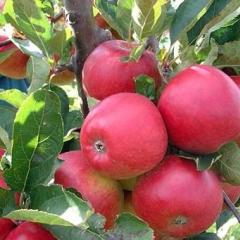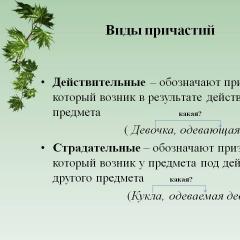The formation of suffering communities. Examples
Paddative communities are formed from transient verbs that control nouns in the vinegenic case without an excuse.
Participle - A special verb form, which means a sign of the subject in action and answers questions: What? What? What? what kind?
Praeling communities indicate a sign of an object that is experiencing an action from outside. The subject itself does not make an action. Compare:
- the peasant who sowing rye is a sown peasant;
- seeing dawn - dawn, visible by us;
- the reading book is a book, readable by me;
- covered tablecloth table - table covered with tablecloth.
Passiatory communion are formed only from transient verbswhich can control nouns in the vinegenic case without an excuse, for example:
- draw (what?) picture - painted painting;
- to bother (what?) The wall is a whitewashed wall;
- to be confused (what?) Powder - crawled powder;
- to see (what?) Fire - visible made fire from the fire.
From the verbs of the imperfect form, we form the suffering communities of both the present and the past time.
Praeling communities of the present
Paddative communities of the present time are formed from the basis of the present time of the verbs of the first auction using a suffix -eat -, second lining - with a suffix -them-:
- find out - learn - to know - know-eat;
- hear - I wonder-AT - I hear-imh.
From several verbs, communion are formed using a suffix - , eg:
- lead - lead - Veda Om-b
- put - attract - inhaled.
Some transient verbs of the imperfect species do not form the suffering communities of the present time:
wait, take, prick, mive, rub, dig, wash, pour, write, build, chop, take care, weave, break, paint, strict, glue, burn, eat, drink etc.
The unstressed vowel in the suffix of the suffering communion of the present time will help to write such an algorithm:
- play - we are playing - playing my prize;
- integral - we are an integral - an integral sign;
- torture - we are tormented - the torment of thirst for thirst;
- see - we see - we are visible on the cloud horizon;
- winged - we depend - depending on the weather.
Examples:
- hesitated by wind bush,
- barely audible rustles
- Published string guitar sound
- fruitful
- parental child
- unacceptable condition for me,
- desire
- emitted by the device
- Self-satisfied party
- significant parts of the word
- under study
- well visible
- the grass burned by the sun
- dependent on others
- for a long time
- The subject studied at school.
Video Tutorial:
Paded Time Practitioners

Passage communities of the past time are formed using suffixes -n , -n , - from the foundation of an indefinite form of the verb, which we get if the end of the infinitive will throw the end -t., -tieg:
- read - Read-nn;
- square - Pokowa-NN;
- building - built-enny;
- covered - covered - t-b
- trouble-th is a raster-t-b.
Suffix -n Joins the verb to the consonant or on -and:
- prini-ti - brought-enny;
- allow-it-it.
At the heart of the verb in front of the suffix often there is an alternation of consonants:
- overdock - Openwog-th;
- it is noted - noticed -
- clamp à-point - highlighted.
In writing of the suffering communion of the past time should be preserved the verb suffix -and I:
- it is decided - it is still it - a -nh;
- syrem-ya-it - Himme-I -nh.
Video Tutorial:
 Paddative communities have a brief form, which varies according to childbirth and numbers, as with an adjective, for example:
Paddative communities have a brief form, which varies according to childbirth and numbers, as with an adjective, for example:
permitted:
- passage is allowed
- hunting is allowed
- swimming is allowed,
- actions are permitted
washed:
- paul is flushed;
- dishes are washed;
- the window was washed away;
- glasses are washed.
Remember: Brief forms of communion as well as adjective are not inclined.
Brief forms of communities are usually a component of the nominal faith in the sentence.
Under the green oaks, the land was covered with dark-brown last year's leaves (V. Veresaev).
Windows in the lower floor and in the mezzanine open, curtains raised, columns and veranda are wound with ivy (A. Tolstoy)
Add an article to bookmarks.


